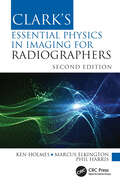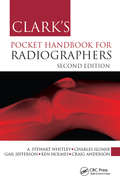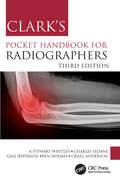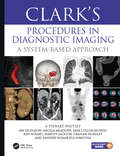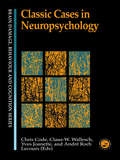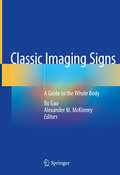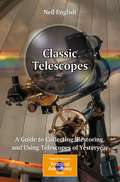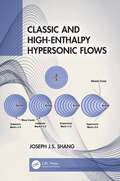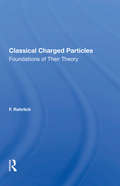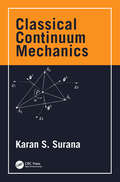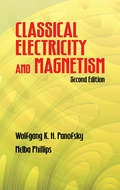- Table View
- List View
Clark's Essential PACS, RIS and Imaging Informatics (Clark's Companion Essential Guides)
by Alexander PeckImaging informatics is a complex and historically rapidly changing field, knowledge of which is central to the practice of all imaging specialists. This convenient pocket guide provides the foundations of knowledge in informatics, allowing radiographers in training and in practice, assistant practitioners and other allied health professionals to understand, use and develop more efficient ways of imaging that will in turn deliver improved patient care.
Clark's Essential Physics in Imaging for Radiographers (Clark's Companion Essential Guides)
by Phil Harris Ken Holmes Marcus ElkingtonThe second edition of this easy-to-understand pocket guide remains an invaluable tool for students, assistant practitioners and radiographers. Providing an accessible introduction to the subject in a reader-friendly format, it includes diagrams and photographs to support the text. Each chapter provides clear learning objectives and a series of MCQs to test reader assimilation of the material. The book opens with overviews of image production, basic mathematics and imaging physics, followed by detailed chapters on the physics relevant to producing diagnostic images using X-rays and digital technologies. The content has been updated throughout and includes a new chapter on CT imaging and additional material on radioactivity, dosimetry, and imaging display and manipulation.Clark’s Essential Physics in Imaging for Radiographers supports students in demonstrating an understanding of the fundamental definitions of physics applied to radiography … all you need to know to pass your exams!
Clark's Pocket Handbook for Radiographers (Clark's Companion Essential Guides)
by Ken Holmes Charles Sloane Gail Jefferson Craig Anderson A Stewart WhitleyDrawn from the bestselling Clark's Positioning in Radiography, this pocket handbook provides clear and practical advice to help radiographers in their day-to-day work. Designed for rapid reference, it covers how to position the patient and the central ray, describes the essential image characteristics and illustrates each radiographic projection with a positioning photograph and a radiograph.
Clark's Pocket Handbook for Radiographers (Clark's Companion Essential Guides)
by Ken Holmes Charles Sloane Gail Jefferson Craig Anderson A Stewart WhitleyDrawn from the renowned reference Clark's Positioning in Radiography, this bestselling pocket handbook provides clear and practical advice to help radiographers in their day-to-day work. Designed and structured for rapid reference, it covers how to position the patient and image receptor as well as the direction and location of the beam, describes the essential image characteristics, and illustrates each radiographic projection with a positioning photograph and corresponding radiographic image.This third edition has been updated to include new positioning photographs reflecting the dominance of direct digital radiography detectors (DDRs), helpful information on the importance of optimisation, exposure factors and geometry in image production, evaluating exposure in digital imaging and aspects of bariatric imaging.
Clark's Positioning in Radiography 13E
by Ken Holmes A. Stewart Whitley Charles Sloane Gail Jefferson Craig Anderson Graham HoadleyFirst published in 1939, Clark's Positioning in Radiography is the preeminent text on positioning technique for diagnostic radiographers.Whilst retaining the clear and easy-to-follow structure of the previous edition, the thirteenth edition includes a number of changes and innovations in radiographic technique. The text has been extensively updated
Clark’s Procedures in Diagnostic Imaging: A System-Based Approach
by Marcus Jackson Ken Holmes Graham Hoadley A Stewart Whitley Jan Dodgeon Angela Meadows Jane Cullingworth Randeep KulshresthaBringing together conventional contrast media studies, computed tomography, ultrasound, magnetic resonance imaging, radionuclide imaging including hybrid imaging using SPECT-CT and PET-CT, DXA studies and digital interventional procedures into one volume, this definitive book is the essential source of information on the use and application of these imaging modalities in radiography. Taking a systemic anatomical approach, carefully designed to be clear and consistent throughout and mirroring that in the popular and established textbook Clark’s Positioning in Radiography, each chapter is highly illustrated and contains sections detailing anatomy, pathologic considerations, procedure methodology, and an evaluation of recommended imaging modalities. Reflecting the latest clinical imaging pathways and referral guidelines including IR(ME)R 2017, the Map of Medicine and RCR iRefer (8E), Clark’s Diagnostic Imaging Procedures will quickly become established as the standard textbook for students of radiography and radiographer assistant trainees and an invaluable desk reference for practising radiologists.
Classic Cases in Neuropsychology (Brain, Behaviour and Cognition)
by Chris Code Yves Joanette Claus-W. Wallesch André Roch LecoursThe importance of detailed examination and theoretical interpretation of the single case has been increasingly recognized in neuropsychology. This book brings together in one volume discussion of the classic cases which have shaped the way we think about the relationships between brain, behaviour and cognition. The single cases covered may be ancient or modern, famous or less well-known. But the book is comprehensive in its coverage of contemporary neuropsychological issues. Represented are classic cases in language, memory, perception, attention and praxis. Some of the cases included are rare, or have acted as catalysts to the development of theory. Some have remained the definitive case; many were the first of their type to be described and gave rise to the development of new syndrome entities. Some are still controversial. In some instances, the cases resulted in major paradigm shifts. Some, while still highly influential, were misinterpreted. But most of them were read only by a few in their original form. Each chapter highlights the relevance of the case for the development of neuropsychology, describes the particular features of the case that are interesting and discusses the theoretical implications.
Classic Cases in Neuropsychology, Volume II (Brain, Behaviour and Cognition)
by Chris Code Yves Joanette Claus-W. Wallesch AndrÉ Roch LecoursFrom a contemporary perspective, Classic Cases in Neuropsychology, Volume II reviews important and significant cases described in historical and modern literature where brain damage has been sustained. The single case study has always been of central importance to the discipline of neuropsychology. Cognitive neuropsychology and cognitive neurolinguistics search for universal structures in thought processes, and single patients are an important means to that end. The role of the single case study in the historical development of the field and its increasing contribution to contemporary work is therefore recognised as crucial.This follow-up to the successful Classic Cases in Neuropsychology (1996) brings together more of the important case investigations which have shaped the way we think about the relationships between brain, behaviour and cognition. The book includes cases from the rich history of neuropsychology as well as important contemporary case studies in the fields of memory, language and perception. Some of the cases described are rare, some are seminal in the field, many were the first of their type to be described and gave rise to new theories, and some are still controversial. As in the first volume, each chapter highlights the relevance of the case to the development of neuropsychology and discusses the theoretical implication of the findings.Classic Cases in Neuropsychology, Volume II will be essential reading for students and researchers alike in the fields of neuropsychology and neuroscience. It will also be of interest to speech and language pathologists, therapists and clinicians in this area.
Classic Imaging Signs: A Guide to the Whole Body
by Bo Gao Alexander M. McKinneyThis book systematically summarizes classic imaging signs' characteristics and theory for whole body imaging, serving as a clinical guide for the understanding, prevention, and diagnosis of miscellaneous entities. In recent years, with the rapid evolution of modern imaging modalities, radiology has secured an irreplaceable role in diagnosis within standard clinical practice and being familiar with radiological signs has become essential.The book provides a multimodality review of more than 300 commonly utilized radiologic signs in radiography, CT, MRI, US, angiography, and nuclear medicine, including PET-CT. It is designed to enhance recognition of specific imaging patterns and enable the image interpreter to confidently reach an accurate diagnosis. Divided into ten chapters dedicated to different anatomic areas, each sign includes detailed discussion that explains the history and meaning of the descriptive or metaphoric sign, alongside illustrative photos for memory aid and clarification. Uniquely written from a practical point of view, each case leads you through a radiology expert’s thought process in analyzing the classic signs with considerations of common misinterpretations and imaging pitfalls. The cases then highlight clinical presentation, relevant pathology, anatomy, physiology, and pertinent imaging features of common disease processes. Key information is distilled into succinct, bulleted points with detailed illustrations and images.This book is an ideal reference and review for practicing radiologists, as well as trainees preparing for licensing examinations.
Classic Telescopes: A Guide to Collecting, Restoring, and Using Telescopes of Yesteryear (The Patrick Moore Practical Astronomy Series)
by Neil EnglishClassic telescopes are of interest to amateur astronomers for a variety of reasons. There are the dedicated collectors, but there are also many amateurs who love the nostalgia they inspire. These telescopes "feel" different from any contemporary telescope and perhaps have a unique ability to reconnect the owner to a bygone age of craftmanship. This book takes a look at traditional telescopes built by the great instrument makers of the 18th and 19th centuries, particularly the dynastic telescope makers, including Dollond, Alvan Clark, Thomas Cooke & Sons, and Carl Zeiss. Also included are lesser luminaries such as John Brashear, John Calver, William Wray, Henry Fitz, and William Henry Mogey. 'Classic Telescopes' covers the key features of the telescopes designed by these manufacturers, and shows how a heady combination of market trends, instrument condition, and pedigree will dictate their prices at auction. 'Classic Telescopes' also shows the reader how to find real bargains! Interviews with top classic telescope collectors (and users) provide the best tips of prospecting for a genuine acquisition.
Classic and High-Enthalpy Hypersonic Flows
by Joseph J.S. ShangClassic and High-Enthalpy Hypersonic Flows presents a complete look at high-enthalpy hypersonic flow from a review of classic theories to a discussion of future advances centering around the Born-Oppenheim approximation, potential energy surface, and critical point for transition. The state-of-the-art hypersonic flows are defined by a seamless integration of the classic gas dynamic kinetics with nonequilibrium chemical kinetics, quantum transitions, and radiative heat transfer. The book is intended for graduate students studying advanced aerodynamics and taking courses in hypersonic flow. It can also serve as a professional reference for practicing aerospace and mechanical engineers of high-speed aerospace vehicles and propulsion system research, design, and evaluation. Features Presents a comprehensive review of classic hypersonic flow from the Newtonian theory to blast wave analogue. Introduces nonequilibrium chemical kinetics to gas dynamics for hypersonic flows in the high-enthalpy state. Integrates quantum mechanics to high-enthalpy hypersonic flows including dissociation and ionization. Covers the complete heat transfer process with radiative energy transfer for thermal protection of earth reentry vehicle. Develops and verifies the interdisciplinary governing equations for understanding and analyzing realistic hypersonic flows.
Classical Analogies in the Solution of Quantum Many-Body Problems (Springer Theses)
by Aydın Cem KeserThis book addresses problems in three main developments in modern condensed matter physics– namely topological superconductivity, many-body localization and strongly interacting condensates/superfluids–by employing fruitful analogies from classical mechanics. This strategy has led to tangible results, firstly in superconducting nanowires: the density of states, a smoking gun for the long sought Majorana zero mode is calculated effortlessly by mapping the problem to a textbook-level classical point particle problem. Secondly, in localization theory even the simplest toy models that exhibit many-body localization are mathematically cumbersome and results rely on simulations that are limited by computational power. In this book an alternative viewpoint is developed by describing many-body localization in terms of quantum rotors that have incommensurate rotation frequencies, an exactly solvable system. Finally, the fluctuations in a strongly interacting Bose condensate and superfluid, a notoriously difficult system to analyze from first principles, are shown to mimic stochastic fluctuations of space-time due to quantum fields. This analogy not only allows for the computation of physical properties of the fluctuations in an elegant way, it sheds light on the nature of space-time. The book will be a valuable contribution for its unifying style that illuminates conceptually challenging developments in condensed matter physics and its use of elegant mathematical models in addition to producing new and concrete results.
Classical Beam Theories of Structural Mechanics
by Andreas ÖchsnerThis book provides a systematic and thorough overview of the classical bending members based on the theory for thin beams (shear-rigid) according to Euler-Bernoulli, and the theories for thick beams (shear-flexible) according to Timoshenko and Levinson. The understanding of basic, i.e., one-dimensional structural members, is essential in applied mechanics. A systematic and thorough introduction to the theoretical concepts for one-dimensional members keeps the requirements on engineering mathematics quite low, and allows for a simpler transfer to higher-order structural members. The new approach in this textbook is that it treats single-plane bending in the x-y plane as well in the x-z plane equivalently and applies them to the case of unsymmetrical bending. The fundamental understanding of these one-dimensional members allows a simpler understanding of thin and thick plate bending members.Partial differential equations lay the foundation to mathematically describe the mechanical behavior of all classical structural members known in engineering mechanics. Based on the three basic equations of continuum mechanics, i.e., the kinematics relationship, the constitutive law, and the equilibrium equation, these partial differential equations that describe the physical problem can be derived. Nevertheless, the fundamental knowledge from the first years of engineering education, i.e., higher mathematics, physics, materials science, applied mechanics, design, and programming skills, might be required to master this topic.
Classical Charged Particles
by Fritz RohrlichWidely-discussed in the theory of classical point charges are the difficulties of divergent self-energy, self-accelerating solutions, and pre-acceleration. This book explains the theory in the context of quantum electrodynamics, the neutral particle limit, and coherence with neighboring theories.
Classical Continuum Mechanics (Applied and Computational Mechanics)
by Karan S. SuranaThis book provides physical and mathematical foundation as well as complete derivation of the mathematical descriptions and constitutive theories for deformation of solid and fluent continua, both compressible and incompressible with clear distinction between Lagrangian and Eulerian descriptions as well as co- and contra-variant bases. Definitions of co- and contra-variant tensors and tensor calculus are introduced using curvilinear frame and then specialized for Cartesian frame. Both Galilean and non-Galilean coordinate transformations are presented and used in establishing objective tensors and objective rates. Convected time derivatives are derived using the conventional approach as well as non-Galilean transformation and their significance is illustrated in finite deformation of solid continua as well as in the case of fluent continua. Constitutive theories are derived using entropy inequality and representation theorem. Decomposition of total deformation for solid and fluent continua into volumetric and distortional deformation is essential in providing a sound, general and rigorous framework for deriving constitutive theories. Energy methods and the principle of virtual work are demonstrated to be a small isolated subset of the calculus of variations. Differential form of the mathematical models and calculus of variations preclude energy methods and the principle of virtual work. The material in this book is developed from fundamental concepts at very basic level with gradual progression to advanced topics. This book contains core scientific knowledge associated with mathematical concepts and theories for deforming continuous matter to prepare graduate students for fundamental and basic research in engineering and sciences. The book presents detailed and consistent derivations with clarity and is ideal for self-study.
Classical Dynamics (Dover Books On Physics Series)
by Donald T. GreenwoodSince Lagrange laid the foundation of analytical dynamics some two centuries ago, the discipline has continued to evolve and develop, embracing the theories of Hamilton and Jacobi, Einstein's relativity theory and advanced theories of classical mechanics.This text proposes to give graduate students in science and engineering a strong background in the more abstract and intellectually satisfying areas of dynamical theory. It is assumed that students are familiar with the principles of vectorial mechanics and have some facility in the use of this theory for analysis of systems of particles and for rigid-body rotation in two and three dimensions.After a concise review of basic concepts in Chapter 1, the author proceeds from Lagrange's and Hamilton's equations to Hamilton-Jacobi theory and canonical transformations. Topics include d'Alembert's principle and the idea of virtual work, the derivation of Langrange's equation of motion, special applications of Lagrange's equations, Hamilton's equations, the Hamilton-Jacobi theory, canonical transformations and an introduction to relativity.Problems included at the end of each chapter will help the student greatly in solidifying his grasp of the principal concepts of classical dynamics. An annotated bibliography at the end of each chapter, a detailed table of contents and index, and selected end-of-chapter answers complete this highly instructive text.
Classical Dynamics: A Contemporary Approach
by Jorge V. José Eugene J. SaletanRecent advances in the study of dynamical systems have revolutionized the way that classical mechanics is taught and understood. Classical Dynamics: A Contemporary Approach is a new and comprehensive textbook that provides a complete description of this fundamental branch of physics. The authors cover all the material that one would expect to find in a standard graduate course: Lagrangian and Hamiltonian dynamics, canonical transformations, the Hamilton-Jacobi equation, perturbation methods, and rigid bodies. They also deal with more advanced topics such as the relativistic Kepler problem, Liouville and Darboux theorems, and inverse and chaotic scattering. A key feature of the book is the early introduction of geometric (differential manifold) ideas, as well as detailed treatment of topics in nonlinear dynamics (such as the KAM theorem) and continuum dynamics (including solitons). The book contains many worked examples and over 200 homework exercises. It will be an ideal textbook for graduate students of physics, applied mathematics, theoretical chemistry, and engineering, as well as a useful reference for researchers in these fields. A solutions manual is available exclusively for instructors.
Classical Electricity and Magnetism (Dover Books on Physics)
by Melba Phillips Wolfgang K. PanofskyCompact, clear, and precise in its presentation, this distinguished, widely used textbook offers graduate students and advanced undergraduates a diverse and well-balanced selection of topics.Subjects include the electrostatic field in vacuum; boundary conditions and relation of microscopic to macroscopic fields; general methods for the solution of potential problems, including those of two and three dimensions; energy relations and forces in the electrostatic field; steady currents and their interaction; magnet materials and boundary value problems; and Maxwell’s equations. Additional topics include energy, force, and momentum relations in the electromagnetic field; the wave equation and plane waves; conducting fluids in a magnetic field; waves in the presence of metallic boundaries; the inhomogeneous wave equation; the experimental basis for the theory of special relativity; relativistic kinematics and the Lorentz transformation; covariance and relativistic mechanics; covariant formulation of electrodynamics; and the Liénard-Wiechert potentials and the field of a uniformly moving electron.The text concludes with examinations of radiation from an accelerated charge; radiation reaction and covariant formulation of the conservation laws of electrodynamics; radiation, scattering, and dispersion; the motion of charged particles in electromagnetic fields; and Hamiltonian formulation of Maxwell’s equations.
Classical Electrodynamics
by Julian Schwinger Lester L. Deraad Jr. Kimball Milton Wu-Yang Tsai Joyce NortonClassical Electrodynamics captures Schwinger's inimitable lecturing style, in which everything flows inexorably from what has gone before. Novel elements of the approach include the immediate inference of Maxwell's equations from Coulomb's law and (Galilean) relativity, the use of action and stationary principles, the central role of Green's functions both in statics and dynamics, and, throughout, the integration of mathematics and physics. Thus, physical problems in electrostatics are used to develop the properties of Bessel functions and spherical harmonics. The latter portion of the book is devoted to radiation, with rather complete treatments of synchrotron radiation and diffraction, and the formulation of the mode decomposition for waveguides and scattering. Consequently, the book provides the student with a thorough grounding in electrodynamics in particular, and in classical field theory in general, subjects with enormous practical applications, and which are essential prerequisites for the study of quantum field theory.An essential resource for both physicists and their students, the book includes a "Reader's Guide," which describes the major themes in each chapter, suggests a possible path through the book, and identifies topics for inclusion in, and exclusion from, a given course, depending on the instructor's preference. Carefully constructed problems complement the material of the text, and introduce new topics. The book should be of great value to all physicists, from first-year graduate students to senior researchers, and to all those interested in electrodynamics, field theory, and mathematical physics.The text for the graduate classical electrodynamics course was left unfinished upon Julian Schwinger's death in 1994, but was completed by his coauthors, who have brilliantly recreated the excitement of Schwinger's novel approach.
Classical Electrodynamics
by Julian Schwinger Lester L. Deraad Jr. Kimball Milton Wu-Yang TsaiClassical Electrodynamicscaptures Schwinger’s inimitable lecturing style, in which everything flows inexorably from what has gone before. Novel elements of the approach include the immediate inference of Maxwell’s equations from Coulomb’s law and (Galilean) relativity, the use of action and stationary principles, the central role of Green’s functions both in statics and dynamics, and, throughout, the integration of mathematics and physics. Thus, physical problems in electrostatics are used to develop the properties of Bessel functions and spherical harmonics. The latter portion of the book is devoted to radiation, with rather complete treatments of synchrotron radiation and diffraction, and the formulation of the mode decomposition for waveguides and scattering. Consequently, the book provides the student with a thorough grounding in electrodynamics in particular, and in classical field theory in general, subjects with enormous practical applications, and which are essential prerequisites for the study of quantum field theory. An essential resource for both physicists and their students, the book includes a ”Reader’s Guide,” which describes the major themes in each chapter, suggests a possible path through the book, and identifies topics for inclusion in, and exclusion from, a given course, depending on the instructor’s preference. Carefully constructed problems complement the material of the text, and introduce new topics. The book should be of great value to all physicists, from first-year graduate students to senior researchers, and to all those interested in electrodynamics, field theory, and mathematical physics. The text for the graduate classical electrodynamics course was left unfinished upon Julian Schwinger’s death in 1994, but was completed by his coauthors, who have brilliantly recreated the excitement of Schwinger’s novel approach.
Classical Electrodynamics
by Julian Schwinger Lester L. Deraad Jr. Kimball Milton Wu-Yang TsaiClassical Electrodynamics captures Schwinger’s inimitable lecturing style, in which everything flows inexorably from what has gone before. Novel elements of the approach include the immediate inference of Maxwell’s equations from Coulomb’s law and (Galilean) relativity, the use of action and stationary principles, the central role of Green’s functions both in statics and dynamics, and, throughout, the integration of mathematics and physics. Thus, physical problems in electrostatics are used to develop the properties of Bessel functions and spherical harmonics. The latter portion of the book is devoted to radiation, with rather complete treatments of synchrotron radiation and diffraction, and the formulation of the mode decomposition for waveguides and scattering. Consequently, the book provides the student with a thorough grounding in electrodynamics in particular, and in classical field theory in general, subjects with enormous practical applications, and which are essential prerequisites for the study of quantum field theory. An essential resource for both physicists and their students, the book includes a ”Reader’s Guide,” which describes the major themes in each chapter, suggests a possible path through the book, and identifies topics for inclusion in, and exclusion from, a given course, depending on the instructor’s preference. Carefully constructed problems complement the material of the text, and introduce new topics. The book should be of great value to all physicists, from first-year graduate students to senior researchers, and to all those interested in electrodynamics, field theory, and mathematical physics. The text for the graduate classical electrodynamics course was left unfinished upon Julian Schwinger’s death in 1994, but was completed by his coauthors, who have brilliantly recreated the excitement of Schwinger’s novel approach.
Classical Electrodynamics (Frontiers in Physics)
by Julian Schwinger Kimball Milton Wu-Yang Tsai Lester L. Deraad Jr.Classical Electrodynamics captures Schwinger's inimitable lecturing style, in which everything flows inexorably from what has gone before. Novel elements of the approach include the immediate inference of Maxwell's equations from Coulomb's law and (Galilean) relativity, the use of action and stationary principles, the central role of Green's functions both in statics and dynamics, and, throughout, the integration of mathematics and physics. Thus, physical problems in electrostatics are used to develop the properties of Bessel functions and spherical harmonics. The latter portion of the book is devoted to radiation, with rather complete treatments of synchrotron radiation and diffraction, and the formulation of the mode decomposition for waveguides and scattering. Consequently, the book provides the student with a thorough grounding in electrodynamics in particular, and in classical field theory in general, subjects with enormous practical applications, and which are essential prerequisites for the study of quantum field theory.An essential resource for both physicists and their students, the book includes a ?Reader's Guide,? which describes the major themes in each chapter, suggests a possible path through the book, and identifies topics for inclusion in, and exclusion from, a given course, depending on the instructor's preference. Carefully constructed problems complement the material of the text, and introduce new topics. The book should be of great value to all physicists, from first-year graduate students to senior researchers, and to all those interested in electrodynamics, field theory, and mathematical physics.The text for the graduate classical electrodynamics course was left unfinished upon Julian Schwinger's death in 1994, but was completed by his coauthors, who have brilliantly recreated the excitement of Schwinger's novel approach.
Classical Electrodynamics (Frontiers in Physics)
by Julian SchwingerClassical Electrodynamics captures Schwinger's inimitable lecturing style, in which everything flows inexorably from what has gone before. This anniversary edition offers a refreshing update while still maintaining Schwinger’s voice.The book provides the student with a thorough grounding in electrodynamics in particular, and in classical field theory in general. An essential resource for both physicists and their students, the book includes a Reader's Guide, which describes the major themes in each chapter, suggests a possible path through the book, and identifies topics for inclusion in, and exclusion from, a given course, depending on the instructor's preference.Carefully constructed problems complement the material of the text. Classical Electrodynamics should be of great value to all physicists, from first-year graduate students to senior researchers, and to all those interested in electrodynamics, field theory, and mathematical physics.The original text for the graduate classical electrodynamics course was left unfinished upon Julian Schwinger's death in 1994, but was completed by his former students and co-authors, who have brilliantly recreated the excitement of Schwinger's novel approach. This anniversary edition has been revised by one of those original co-authors, Kimball Milton.
Classical Electrodynamics: A Concise and Detailed Guide
by Meng Lee LeekClassical Electrodynamics: A Concise and Detailed Guide covers the essential theoretical foundations of electrodynamics from the vector calculus formulation to the classical gauge field theory.The essential theoretical formalism of electrodynamics is covered with all mathematical derivations provided. The derivations are uniquely presented with inline, line-by-line explanations, which makes every derivation easy to follow. The reader does not need to struggle to fill in the steps, and the reader can focus on pondering over the physical content and implications of the derived results. The content is supplemented with numerous exercises with their complete solutions included.This book is for students who are interested in theoretical physics and seek an efficient but proper preparation of the essential knowledge in electrodynamics and classical gauge field theory. With this background knowledge, the student will be able to progress further into concepts beyond electrodynamics, like general relativity or quantum gauge field theories.
Classical Electrodynamics: A Modern Perspective (UNITEXT for Physics)
by Kurt LechnerThis book addresses the theoretical foundations and the main physical consequences of electromagnetic interaction, generally considered to be one of the four fundamental interactions in nature, in a mathematically rigorous yet straightforward way. The major focus is on the unifying features shared by classical electrodynamics and all other fundamental relativistic classical field theories. The book presents a balanced blend of derivations of phenomenological predictions from first principles on the one hand, and concrete applications on the other. Further, it highlights the internal inconsistencies of classical electrodynamics, and addresses and resolves often-ignored critical issues, such as the dynamics of massless charged particles, the infinite energy of the electromagnetic field, and the limits of the Green’s function method. Presenting a rich, multilayered, and critical exposition on the electromagnetic paradigm underlying the whole Universe, the book offers a valuable resource for researchers and graduate students in theoretical physics alike.

